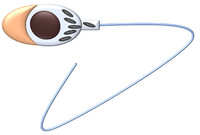Difference between revisions of "Specialised Cell"
| Line 7: | Line 7: | ||
: '''Specialised cells''' make an [[organism]] more efficient than if every cell was the same. | : '''Specialised cells''' make an [[organism]] more efficient than if every cell was the same. | ||
: '''Specialised cells''' has special [[adaptation]]s that make them good at their function. | : '''Specialised cells''' has special [[adaptation]]s that make them good at their function. | ||
| − | + | : Cells can be '''specialised''' by having more [[mitochondria]] or [[chloroplast]]s than usual. They might be '''specialised''' with tiny hairs called [[cilia]], or have an elongated shape. | |
| + | These are some '''specialised cells''' in plants that you should know: | ||
*[[Palisade Cell]] | *[[Palisade Cell]] | ||
*[[Spongy Mesophyll Cell]] | *[[Spongy Mesophyll Cell]] | ||
Revision as of 13:47, 5 September 2018
Contents
Key Stage 3
Meaning
A specialised cell is a cell that has a special shape or special features to do a certain job in the organism.
About Specialised Cells
- All multicellular organisms have specialised cells.
- Specialised cells make an organism more efficient than if every cell was the same.
- Specialised cells has special adaptations that make them good at their function.
- Cells can be specialised by having more mitochondria or chloroplasts than usual. They might be specialised with tiny hairs called cilia, or have an elongated shape.
These are some specialised cells in plants that you should know:
Some Specialised cells in animals that you should know:
Specialised Plant Cells
| Palisade Cell | Spongy Mesohpyll Cell | Guard Cells |
| Xylem Cell | Root Hair Cell | |
Specialised Animal Cells
| Muscle Cell | Nerve Cell | Ciliated Epithelial Cells |
| Red Blood Cell | White Blood Cell | Sperm Cell |
| Egg Cell | ||











